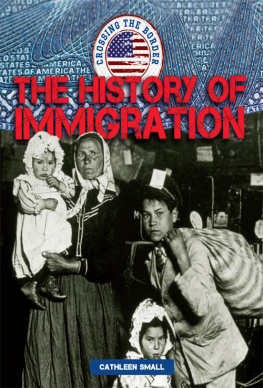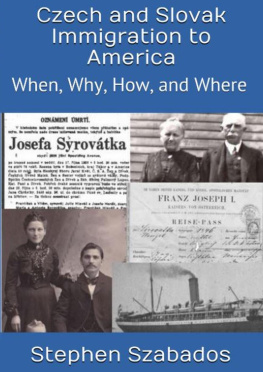History Of German Immigration In The United States
And Of Successful German-Americans And Their Descendants
GEORGE VON SKAL
History of German Immigration In The United States, G. von Skal
Jazzybee Verlag Jrgen Beck
86450 Altenmnster, Loschberg 9
Deutschland
ISBN: 9783849659097
www.jazzybee-verlag.de
admin@jazzybee-verlag.de
CONTENTS:
INTRODUCTION
THIS work is intended to be a record of all that Germans have accomplished in the United States a record of honest endeavor, energy, perseverance, strength and achievement. It shall, in addition, show the part that the American citizen of German blood has taken in the making of these United States, in peace and war, on the battlefield as well as in the counting house, the workshop and laboratory, in the realm of science and education or in the long fight that was necessary to extend civilization and culture over a continent.
It contains a history of German immigration in the United States from the first settlements to the present day, showing what the Germans were who left the fatherland, why they came, and what they did in their new country. Every incident throwing light upon the work done by the German element has been made use of to give a complete, though concise, and impartial recital of its activity, and a description of the influence it has exerted upon the development of the Union.
In the second part the biographies of many Americans of German nativity or descent are given. History is not complete if it chronicles only the deeds of the few who in times of strife and combat rise above the surface; it must tell us of the many who have fought and succeeded. The value of so large and important a part of the American people as the German immigrants and their descendants can be fully understood only if it is shown how many of them have been successful, and how they have, by long and earnest travail, risen to unusual heights.
THE EDITOR.
HISTORY OF GERMAN IMMIGRATION IN THE UNITED STATES
According to the last Census there were living in the United States in 1900 not less than 2,669,164 persons born in the German Empire. Within the few years passed since then, no great change can have taken place, for the number of German immigrants has probably not been much larger than the decrease of the German-American population by death or the return of Germans to the Fatherland. There is, however, no doubt but that the number of Germans living in the United States is considerably larger than the figures given above, for the Census, in determining nationality, does not take into account race but political divisions, and calls only those persons Germans who have been born within the borders of the German Empire. Several hundred thousand immigrants who have come from Switzerland, Austria and the Baltic provinces of Russia, and who are thorough Germans in race, tradition and customs, are not classed as such by the Census. It is, therefore a very conservative estimate if we assume that the number of Germans living in the United States exceeds three millions. But even then we cannot estimate the strength of the German element and the influence it exerts, correctly, because we must take into consideration the descendants of the immigrants, in whom, although moderated by American influences, German ideas and ways of thinking are more or less preserved. Here statistics cannot help us, for while the Census Bureau has given us a number of tables showing how many native-born Americans had German fathers, mothers, or both, this information, valuable as it is, does not tell us how many of these descendants may be called German-Americans in the sense that they have retained some of the valuable traits of their ancestors. How quickly complete Americanization destroys even the last vestige of the German origin depends upon innumerable circumstances, and it happens frequently that children who were born in Germany and brought to America in early youth lose all distinguishing traits before they grow up, and retain nothing that betrays their origin, while on the other hand, many families remain German in disposition and certain ways of thinking for three and even four generations. Where, for instance, the knowledge of the German language is cultivated, and the children are made acquainted with German literature, the German influence upon the mind becomes strong enough to be traced and in turn exerted even after all connection with the Fatherland has long ceased. Taking all these factors into account, and considering all manifestations of German origin as, for instance, the numbers of societies which are either composed of Germans and their descendants in the first generation, or which, although outwardly American, pursue objects and ideals essentially German and viewing the strength of movements based upon German ideas, the conclusion does not appear extravagant that the so-called German-American element comprises nearly ten percent of the population of the United States. The percentage of German blood in the American people is undoubtedly much larger; careful and conservative investigators have placed it as high as twenty-five percent.
It goes without saying that so large a part of the total population of the country must necessarily have exerted considerable influence upon the formation of the character of the American people. Whether this influence has always been used in the right way and with the full strength it possessed is an open question and has been doubted by many, especially by Germans with scant knowledge of American conditions. The United States would long have been a German country and the English language would have disappeared if pen and printing ink could have accomplished it. Extravagant love of race or country and unreasoning enthusiasm based upon impractical hopes and dreams are, however, not sufficient to bring about tangible results and do not qualify their possessors to sit in judgment upon the work accomplished by Germans in America. To do this a thorough knowledge of the history of the country, of its institutions and evolution, as well as of the German immigration since its beginning is required. In another chapter the attempt will be made to show what Germans could accomplish here, and what they have done, but before this is undertaken a short but exhaustive sketch of the history of German immigration will be given.
There is, unfortunately, no complete history of German immigration in existence. A number of works have been written dealing with single states or treating short periods. But sufficient material is at hand to show how widely the quality of the immigrants differed in the several periods during which Germans arrived here in large numbers, and how far apart these periods were. A careful examination of all known facts will not only show what the Germans brought to America but also whether they made full use of the opportunities extended to them. And it may be stated right here that the result cannot fail to raise the popular estimate of the value of the German immigrant.
The first traces of the German immigration extend back to the settlement of Manhattan Island by the Dutch. Peter Minuit or Minnewit, who was appointed director-general of New Netherlands by the Amsterdam Chamber of Commerce and purchased Manhattan Island from the Indians for sixty guilders, came from Wesel and was therefore a German. Among the colonists who arrived here during the first half of the Seventeenth Century were many Germans, principally from the lower Rhine, from Geldern, Westphalia, Friesland and Dithmarschen. Germany and Holland were at that time neither politically nor economically as sharply separated as now. The Dutch language was closely related to the dialects spoken in the neighboring provinces of Germany and its difference from them became more marked much later through the in fluence of the Flemish. German immigration was not confined to the districts named, however, for many came from Holstein, Hesse, Thuringia, Swabia, the Hanse cities and from Switzerland. These colonists could exert no influence whatever upon the development of the new country. They were not numerous enough, consisted mainly of laborers and mechanics, and possessed probably very little education. They soon lost their identity, changed their names to make them sound Dutch, and disappeared completely among the Hollanders. Every trace of them would be lost if shipowners in Amsterdam had not kept and preserved the lists of the passengers they for warded to America.










